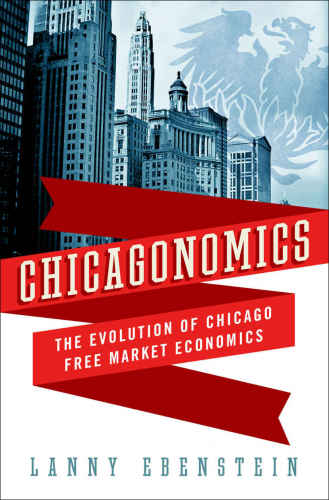
Chicagonomics
The Evolution of Chicago Free Market Economics
کتاب های مرتبط
- اطلاعات
- نقد و بررسی
- دیدگاه کاربران
نقد و بررسی

September 14, 2015
Ebenstein (Milton Friedman: A Biography), an economics lecturer at UC Santa Barbara, offers a comprehensive and noteworthy examination of the University of Chicago's influence on economic theory in the U.S. He emphasizes classical liberalism and free market economics, as propagated by renowned Chicago scholars such as Jacob Viner, Frank Knight, Milton Friedman, and Friedrich Hayek. The author begins with the university's founding in 1892 by John D. Rockefeller as a research-driven institution intended "to advance the frontiers of human knowledge." While painting a thorough picture of his formidable subjects' academic contributions, Ebenstein also offers details of their personal lives and temperaments, discussing Viner's childhood and Knight's tendency to alienate his colleagues but inspire his students. Though most likely to appeal to academics, this work can enlighten general readers as to economic theory's historical impact, as seen in Viner's role advising F.D.R. and in Friedman's ideas concerning monetary policy, taxation, and regulation while advising President Reagan and Prime Minister Thatcher. The subject matter is scholarly, but the tone and style are accessible, clear, and even entertaining.

August 15, 2015
Ebenstein (Economics/Univ. of California, Santa Barbara; Milton Friedman: A Biography, 2007, etc.) explores the history and reputation of the Chicago School of Economics. The author chronicles the history of what began in the 1890s as the university's Department of Political Economy (created by John Rockefeller's foundation), and he argues persuasively that until the late 1940s, its approach to economics was different than the views now attributed to the Chicago School. In particular, the author continues his examination of the public advocacy of Milton Friedman (1912-2006), the Nobel Prize winner who played a significant role in shaping the policy of Ronald Reagan's presidency and Margaret Thatcher's prime ministry. Ebenstein quotes Ed Meese, one of Reagan's closest advisers, who called Friedman the administration's "guru." The author asserts that as public figures, "the virtual neoanarchism that both [Friedman and Friedrich von Hayek] preached in their later years" placed them "outside the classical liberal tradition, which generally counsels incremental and gradual change." Contemporary conservative economics are closer to Friedman's later political activities than either his or Chicago's economics. Ebenstein also quotes leading economists like Paul Krugman, Warren Samuels, Agnar Sandmo, and others on the rigor of Friedman's professional economics as opposed to his "non-rigorous" popularizing activities. The author documents how professors like Jacob Viner and Frank Knight were much closer to the liberal school of British political economy associated with Adam Smith, Jeremy Bentham, and John Stuart Mill. Their concept of the "greatest happiness for the greatest number" favored individual freedoms but did not exclude government's potential to contribute to total wealth creation, even through tax policy, and thus to increasing individual happiness. Ebenstein traces how utilitarian ideas contributed to the department and shows where Friedman's school differed. A detailed argument and an absorbing narrative combine in this important contribution to the field.
COPYRIGHT(2015) Kirkus Reviews, ALL RIGHTS RESERVED.

























دیدگاه کاربران